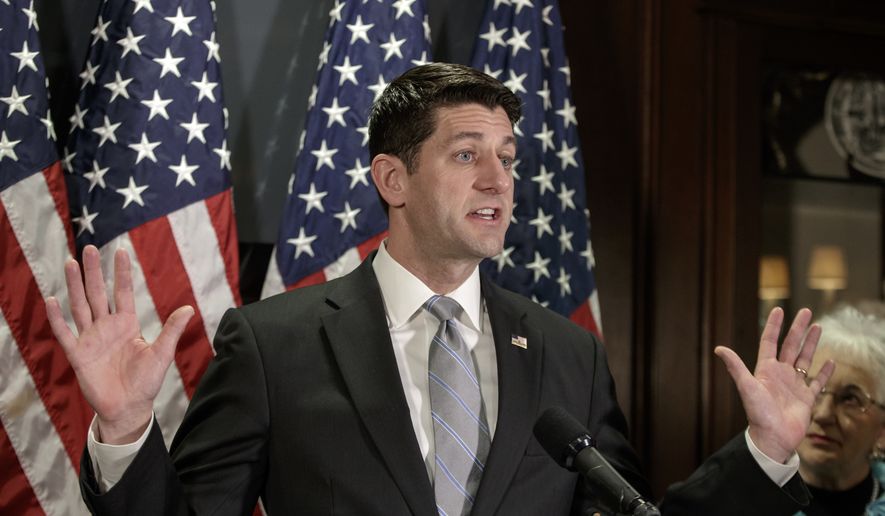House Republicans tried to kickstart their bid to replace Obamacare Tuesday by advancing bills that prevent lottery winners or other undeserving people from qualifying for Medicaid, saying the government insurance program for the poor is costing taxpayers too much and cannot bear enrollees who don’t need it.
Rep. Michael Burgess said treating lump-sum, jackpot winnings of at least $80,000 as if they were obtained over multiple months would give Medicaid a better picture of whether someone needs to tap the safety-net program, since the enrollee’s income moving forward would not reflect the one-time windfall.
“I hope we can all agree that Powerball lottery winners should not be eligible to receive Medicaid,” said Mr. Burgess, Texas Republican and chairman of the Energy and Commerce Committee’s panel on health.
The subcommittee approved the legislation, 20-11, with only one Democrat supporting the measure. A second bill, which would count annuity payments to a spouse against someone’s income threshold for Medicaid, passed along party lines.
Democrats rejected the bills as an inefficient attempt to strip benefits from certain families. They cited a lack of nationwide data on how many lottery winners are actually drawing from Medicaid, though GOP staff pointed to hundreds of winners in Michigan.
“These bills merely chip away at the program around its edges, making no meaningful improvements,” said Rep. Frank Pallone of New Jersey, the committee’s ranking Democrat.
Full committee Chairman Rep. Greg Walden characterized the markup an “excellent start” to the GOP’s step by step approach to overhauling health care, as party leaders try to assuage conservatives who think the party will renege on its campaign vow to swiftly repeal and replace Obamacare.
“They are small steps, but they are steps forward in a journey,” the Oregon Republican said.
The Congressional Budget Office estimates federal spending on Medicaid, which now covers 72 million people, will spike from an estimated $363 billion in 2016 to $650 million by 2027.
Republicans are particularly worried about the long-term budget impact of expanding Medicaid under Obamacare in 31 states in D.C.
Some expansion states say enrollment ballooned beyond expectations, leaving their budgets in trouble as federal financing of the expansion population slowly phases down to 90 percent by 2020.
In early 2016, then-President Obama vetoed a Republican bill that would have gutted Obamacare, including its expansion of Medicaid.
Some House conservatives say leaders should reprise and pass that bill now. They’re growing impatient with the glacial pace of efforts to scrap Obamacare alongside President Trump, who recently admitted the replacement effort might stretch into next year.
House Speaker Paul D. Ryan sought to clarify the timeline Tuesday, saying Congress will do its work in 2017 but the actual implementation of its plans could bleed into future years.
“We are going to be done legislating with respect to health care and Obamacare this year,” Mr. Ryan said.
GOP leaders say they plan to repeal and replace as much of the 2010 law as they can by this spring under a fast-track budget process that allows them to avoid a Democratic filibuster in the Senate. They say this year’s effort will be modeled on the effort that Mr. Obama vetoed, though they’ve fallen behind schedule in outlining plans for this year’s go-around.
Republicans then plan to pass piecemeal legislation that fully replaces Obamacare with a market-oriented program, although those bills will need support from at least eight Senate Democrats to proceed.
“There is no excuse for getting this wrong,” Mr. Ryan said. “That is why, as promised, we are taking action step by step.”
Democrats jeered the GOP efforts from the committee dais, saying the GOP’s plans are sputtering, creating uncertainty in the insurance market, and that Tuesday’s bills did little to move the ball.
“Repeal and replace, repeal and replace, repeal and replace. It was pounded across America,” Rep. Ben Ray Lujan, New Mexico Democrat, said. “And now, it’s gone.”
• Tom Howell Jr. can be reached at thowell@washingtontimes.com.




Please read our comment policy before commenting.